Jindal Initiative on Research in IP and Competition
International Conferences
The Implications of Emerging Technologies in India
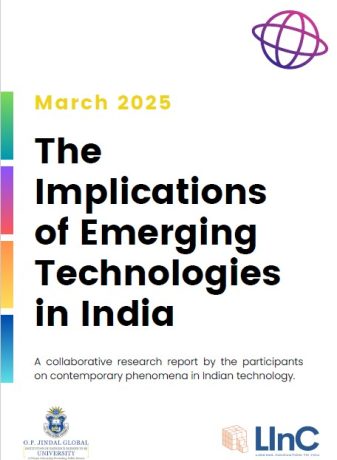
A collaborative research report by the participants oncontemporary phenomena in Indian technology. Aninitiative by LInC, the Legal Incubation Centre at O.P. JindalGlobal University.
This report focuses on the intersection of technology and various sectors inIndia. It highlights the need for more infrastructure and the need to adopt anddevelop ICTs in the legal industry. A lack of proper infrastructure leads to longdelays and difficulty accessing the justice system.
7th JIRICO International Conference on Innovation for Shared Prosperity: The Future of India's Emerging Technologies
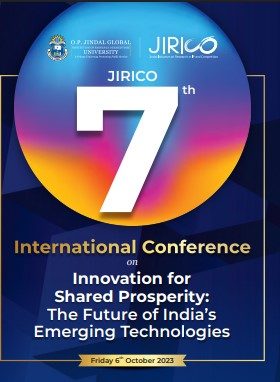
The digital revolution in recent years has brought to
centre stage the critical role of emerging technologies that could revolutionize
India's digital economy. The role of such emerging technologies which
incentivize innovation, and disrupts existing market forces, is critical for
India's digital future. A series of recent policy and legal developments in
India could not be timelier. This conference will focus on the need for
balanced policymaking in the areas of emerging technologies — from artificial
intelligence (AI), data protection, internet regulation, blockchain, fintech
and antitrust to promote technological innovation.
IP, Privacy and Access to Justice in Digital World
Hosted by JIRICIO, JGLS and Georgetown Law School
December 13, 2019
The pervasive nature of modern digital environment has raised concerns about privacy, how information is collected, who owns it, what can be done with it and where it should be stored. While digital environment has facilitated businesses to thrive, it has also led to a sharp increase in cybercrimes and digital piracy. On the other hand, new technologies can enable greater access to the civil justice system. The conference on IP, Privacy, and Access to Justice in the Digital World organised by JIRICO in association with Georgetown Law focused on cyber security and surveillance, IP rights and challenges in the digital era, data protection and data governance, the role of technology in promoting access to justice and intermediary liability.
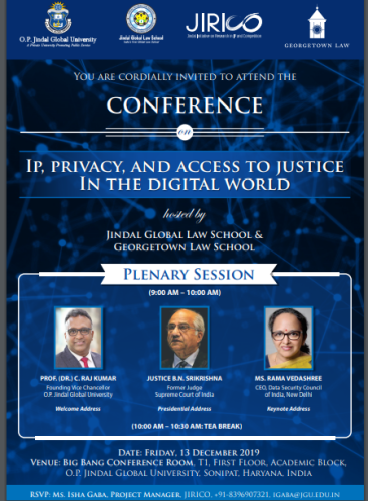
5th International Conference
on
Innovation for Shared Prosperity: Past Tense, Present Perplexed, Future Perfect
August 27, 2019
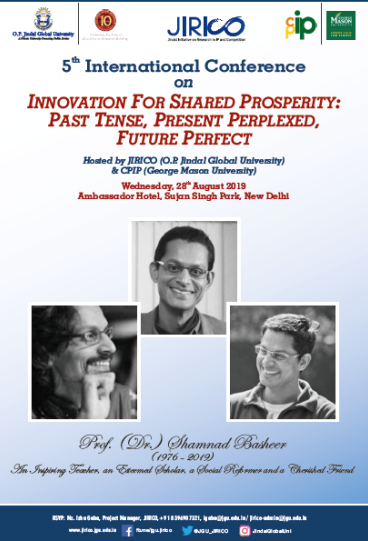
The transitions taking place in the intellectual property regimes and innovation ecosystems at present promise a very exciting future for innovation-intensive industries and governments. With proliferation of product and services based on Internet of Things, 5G, Artificial Intelligence and machine learning, the focus is being increasingly shifted to bringing in more transparency and clarity. JIRICO’s 5th International Conference on Innovation for Shared Prosperity: Past Tense, Present Perplexed, Future Perfect, hosted in collaboration with CPIP (George Mason University), served as a platform to discuss this trajectory and the advancements that the future beholds for the information and technology industry.
4th International Conference
on
Innovation for Shared Prosperity: GR[IP] on Balanced Policy Making
New Delhi
August 20-21, 2018
The digital revolution in recent years has brought to centre-stage the critical role of the patent system that incentivises technology innovation, and the role of antitrust policies that ensure healthy market competition. A series of recent policy developments in India, China, Europe, United States, and Japan could not be timelier. Given this background, JIRICO’s 4th International Conference on Innovation for Shared Prosperity: GR[IP] on Balanced Policymaking, held during August 20-21, 2018 focused on the need for balanced policy making in the areas of intellectual property rights and antitrust to promote technological innovation
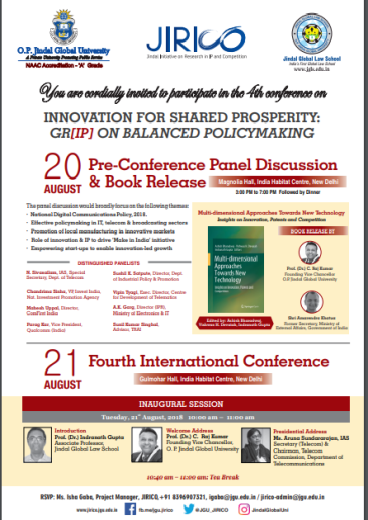
3rd International Conference
on
Innovation for Shared Prosperity: Deliberations on Standard Setting and Patent Licensing
New Delhi
4-5 November, 2017
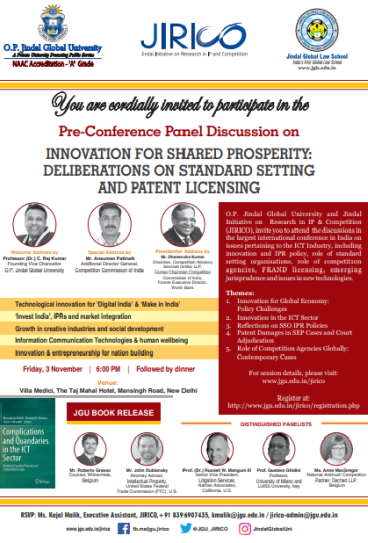
The information and communication technologies (ICT) sector plays a vital role in the growth of India’s economy. With the second largest consumer base, the government of India’s Digital India and Make in India initiatives rely on the sector for its objective of enhancing digital literacy, improved connectivity and access to technology. The sector, however, currently faces several challenges at both the global and national levels with respect to technical standard setting and licensing of patents in communications technology. JIRICO’s 3rd International Conference on Innovation for Shared Prosperity: Deliberations on Standard Setting and Patent Licensing, held in New Delhi on 4-5 November 2017 addressed issues critical to innovation in the ICT industry and deliberated with all stakeholders about the way
forward.
2nd International Conference
on
Standardization, Patents and Competition Issues: Developments and Perspectives in the Asia Pacific Region and Europe
New Delhi
June 10-11 , 2017
A key challenge that issues relating to patents is facing is in relation to the clarity and consistency in the interpretation and evolution of jurisprudence in India and the Asia Pacific region. Standard essential patents (SEPs) are fairly common in the telecom sector. Standards declared by standard setting organizations (SSOs) allow innovators to negotiate licenses with implementers on fair, reasonable, and non- discriminatory terms. The conference explored the following critical themes: (i) SSOs' Patent Policies and Due Process Principles; (ii) Reasonable Royalty Determination: Principles and Best Practices; (iii) Patent Bundling Leading to Anti-Competitive Practices; and (iv) Transparency and Procedural Fairness in Antitrust Enforcement.
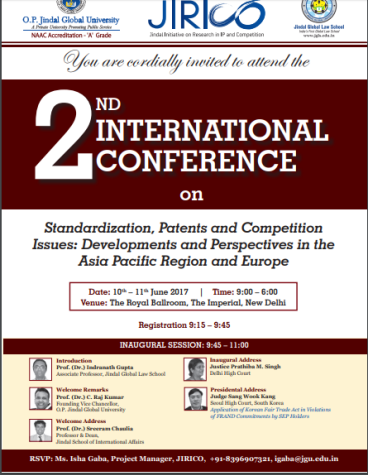
1st International Conference
on
Innovation,Intellectual Property, Competition and Standard Setting in the ICT Sector
New Delhi
August 20-21 2016
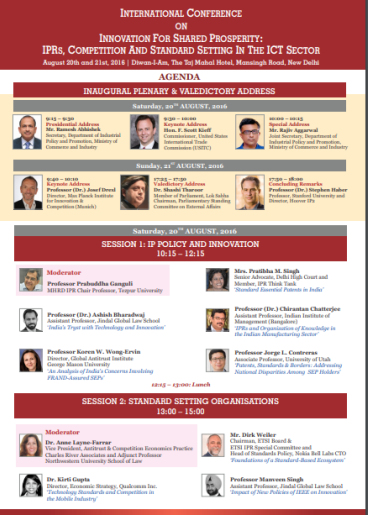
Intellectual property (IP) rights, patents in particular, are seen as necessary to foster technological innovation in a globalised world. The conference explored these themes: (i) India’s national IP policy making (ii) Intellectual property and IP policies as incentives for innovation in the information and communication technologies (ICT) sector; (iii) Role of standard setting/development organizations and their IP policies; (iv) Potential competition concerns with standard essential patents; (v) Patent licensing and technology transfers in the ICT sector; (vi) fair, reasonable and non-discriminatory (FRAND) commitments and conflicts in the ICT sector; (vii) Emerging jurisprudence in FRAND litigation in the US, Europe and Asia; (viii) Jurisdiction of courts vs. antitrust/competition authorities; (ix) Consumer welfare and market integration in the ICT Sector; and new evidence from innovation surveys and patent data.
FOLLOW US ON SOCIAL MEDIA:
